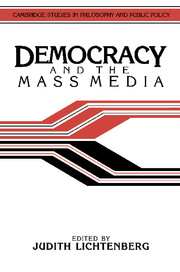Book contents
- Frontmatter
- Contents
- Preface
- List of contributors
- Introduction
- 1 Liberal constraints on private power?: reflections on the origins and rationale of access regulation
- 2 Liberalism and free speech
- 3 Foundations and limits of freedom of the press
- 4 Why the state?
- 5 Practices of toleration
- 6 Access in a post–social responsibility age
- 7 Who decides?
- 8 Four criticisms of press ethics
- 9 Political communication systems and democratic values
- 10 Mass communications policy: where we are and where we should be going
- 11 Content regulation reconsidered
- 12 The rationale of public regulation of the media
- 13 The role of a free press in strengthening democracy
- Index
8 - Four criticisms of press ethics
Published online by Cambridge University Press: 05 June 2012
- Frontmatter
- Contents
- Preface
- List of contributors
- Introduction
- 1 Liberal constraints on private power?: reflections on the origins and rationale of access regulation
- 2 Liberalism and free speech
- 3 Foundations and limits of freedom of the press
- 4 Why the state?
- 5 Practices of toleration
- 6 Access in a post–social responsibility age
- 7 Who decides?
- 8 Four criticisms of press ethics
- 9 Political communication systems and democratic values
- 10 Mass communications policy: where we are and where we should be going
- 11 Content regulation reconsidered
- 12 The rationale of public regulation of the media
- 13 The role of a free press in strengthening democracy
- Index
Summary
In this essay, I discuss four criticisms of press ethics. I do not claim to know how prevalent these criticisms are, but I think they will be familiar enough to readers from the popular debates of the day.
THE PRESS AS JACKALS
Here is how some people talk about the press: “The press are a pack of jackals. They are so hungry and greedy for a story – any story – that whenever they smell one, they go after it without restraint or respect for privacy, rummaging everywhere, hounding anyone, and all without considering whether the story is worth all the poking and rooting.” Reporters, so these critics would have it, are professional vultures preying on the unfortunate. A plane crashes and a microphone is thrust into the grieving widow's face; a hostage sends a video message from Lebanon and a camera crew is dispatched to televise the family's tearful reaction.
But merely to express a distaste for the nerve of some reporters does not take us very far. Left unanswered is the question of what distinguishes legitimate from illegitimate press hounding. Most journalists would try to answer that question, I believe, by invoking some version of the “public–private” distinction. In this view, certain matters are unambiguously private (the widow's grief, for example) and others are just as clearly public (the president's campaign promises). The good journalist pesters the president but leaves the widow alone.
- Type
- Chapter
- Information
- Democracy and the Mass MediaA Collection of Essays, pp. 229 - 268Publisher: Cambridge University PressPrint publication year: 1990
- 3
- Cited by



